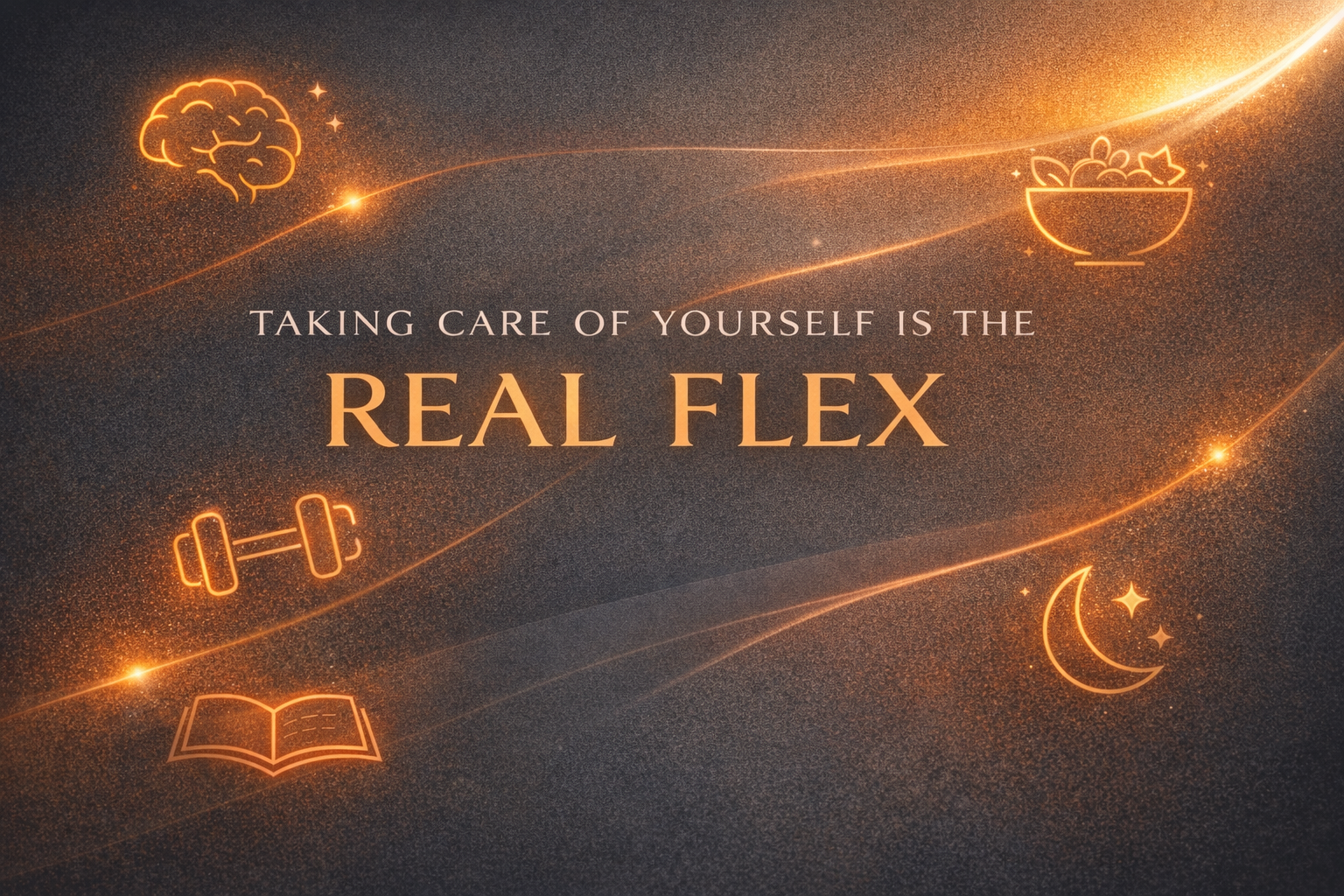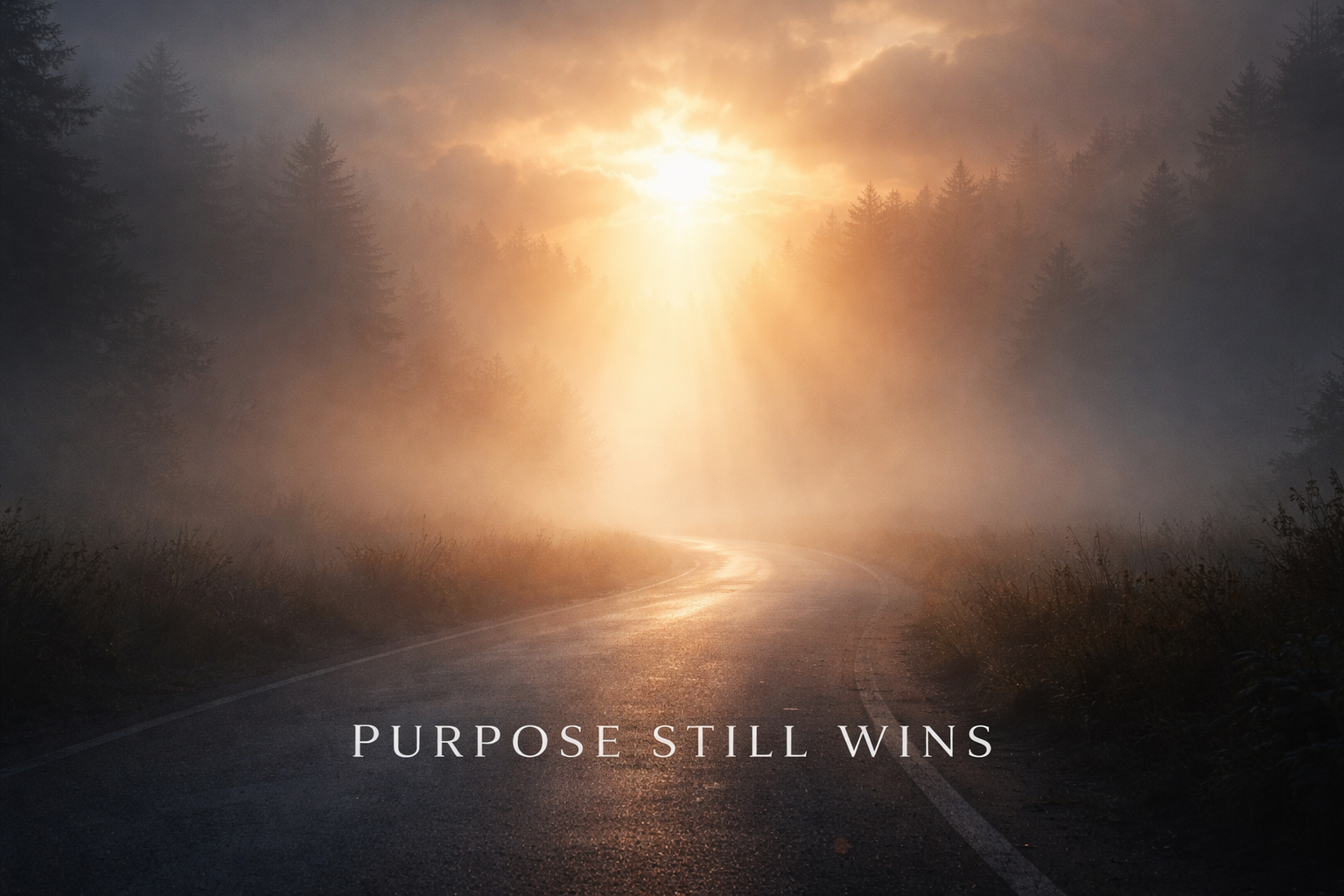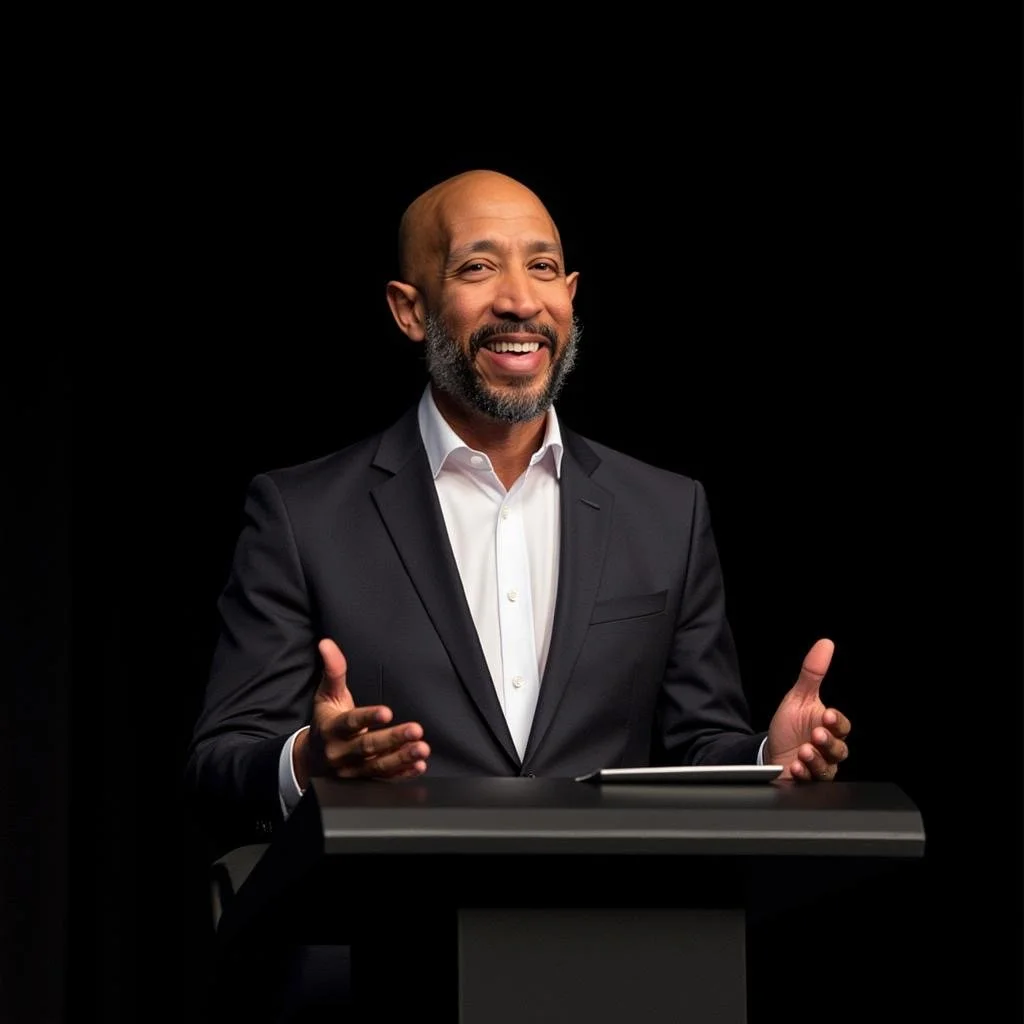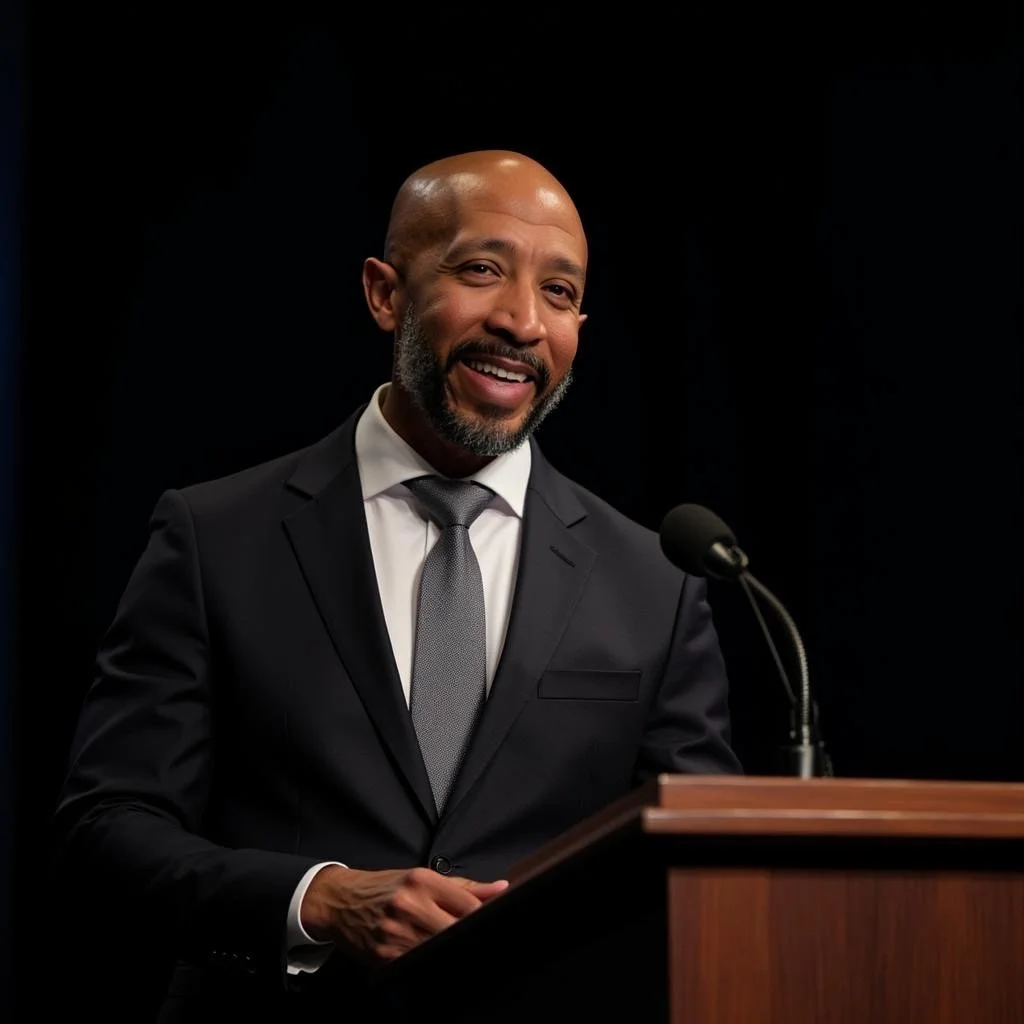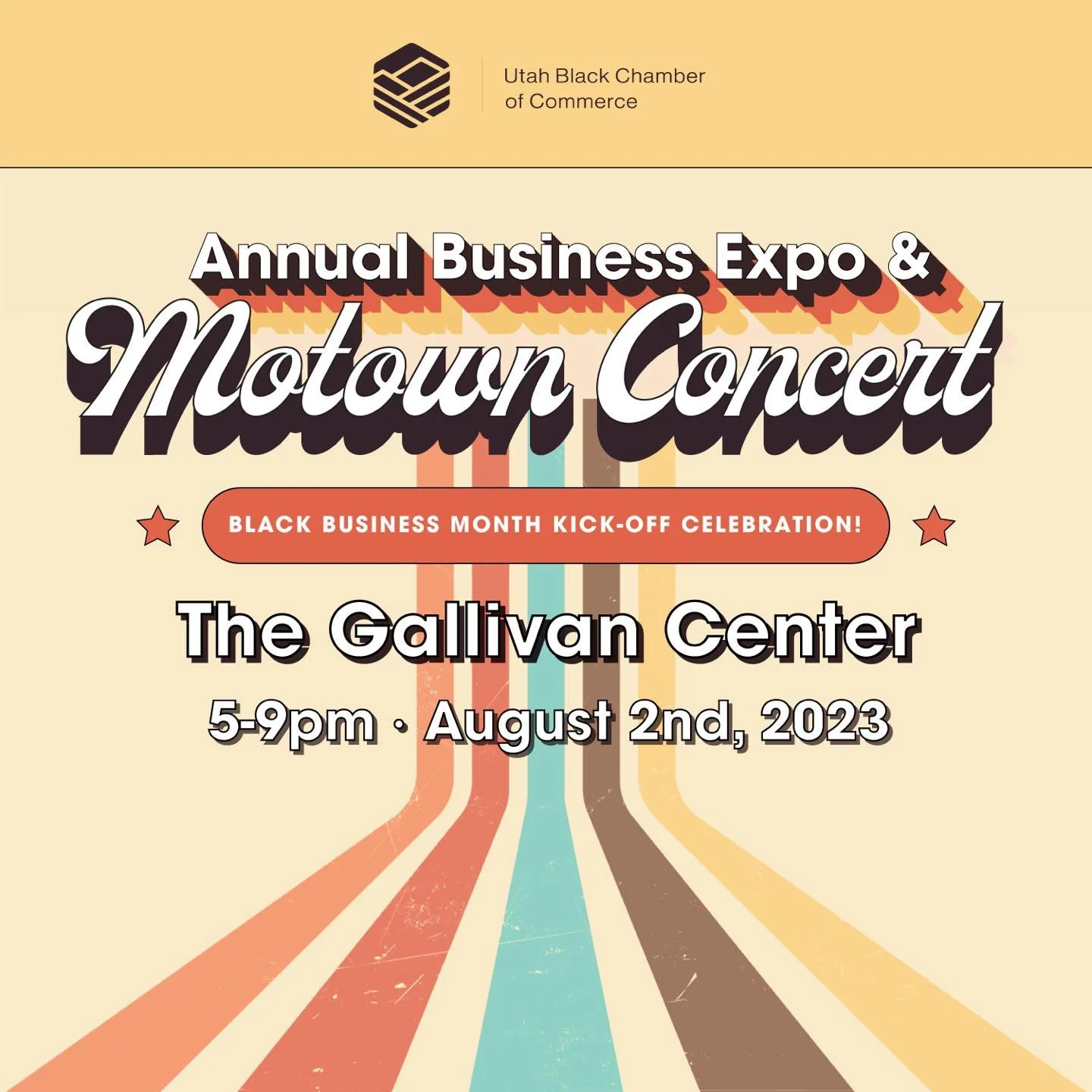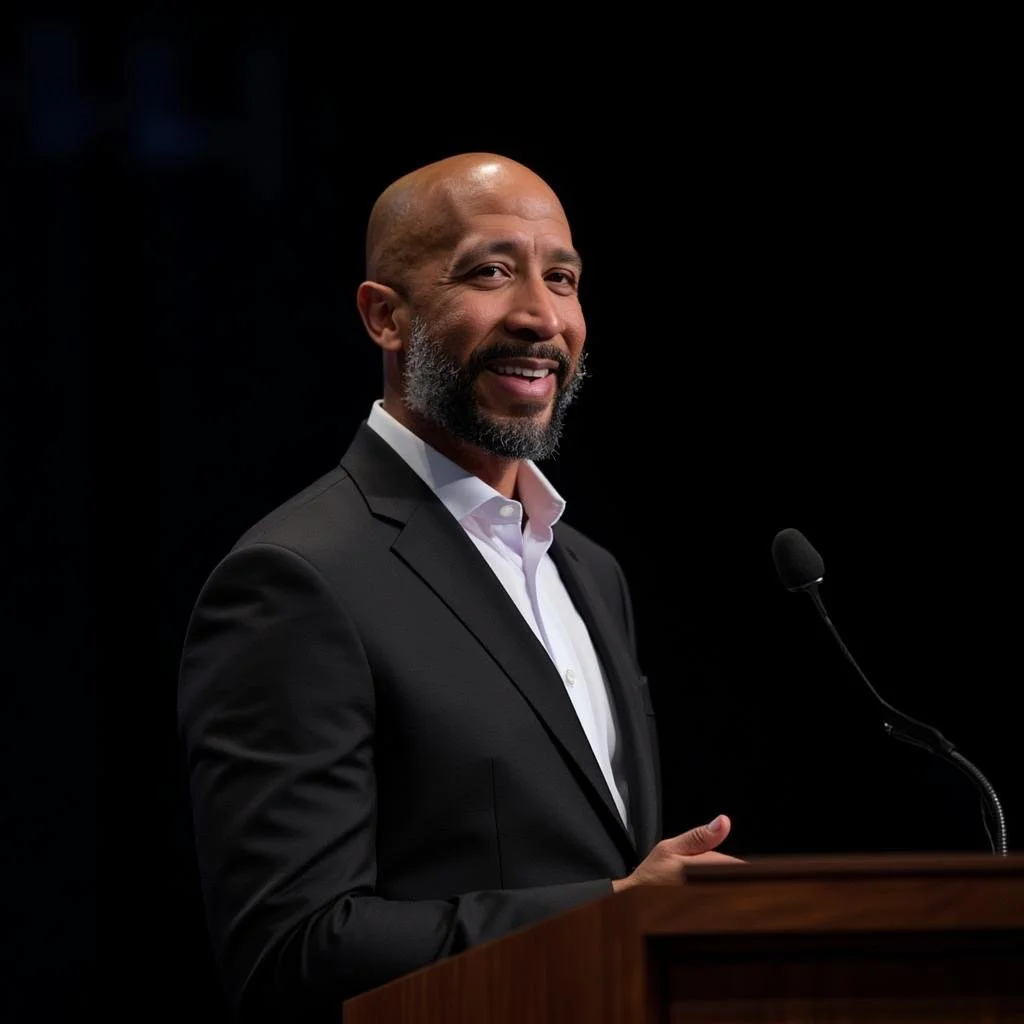
MY BLOG
Since When Did Working Hard Become a Flex?
We celebrate working hard as a badge of honor, but real success is having time, energy, and freedom to enjoy the life you’re building. Taking care of yourself is the real flex.
Somewhere along the way, working hard became something we brag about.
Long hours. No days off. Always tired. We say it like it’s proof of success — like exhaustion is a receipt that validates our ambition.
But I’ve started asking myself a different question:
Is working hard really the flex… or is it just what we’ve been conditioned to celebrate?
Busy Doesn’t Mean Successful
We live in a culture that rewards burnout and calls it dedication. But being busy doesn’t automatically mean you’re building something meaningful. And working yourself into the ground doesn’t guarantee fulfillment, freedom, or peace.
Success, to me, looks different now.
It looks like:
Having time to think
Having energy to create
Having space to rest
And still building something impactful
That’s the real flex.
The Goal Isn’t to Work Hard — It’s to Live Well
Working hard was never supposed to be the destination. It’s a tool, not a lifestyle.
The real goal is to leverage your skills, experience, and relationships in a way that allows you to build something great and enjoy the life you’re creating. If success costs you your health, your relationships, and your joy, then what did you really gain?
I don’t want to work hard just to say I worked hard. I want to work smart, purposefully, and sustainably.
Taking Care of Yourself Is Strategic
This is where my MEDS come in.
Mindset. Exercise. Diet. Sleep.
These aren’t just self-care habits — they’re performance strategies. They’re how I stay focused, energized, and clear enough to make good decisions.
When my MEDS are right:
I don’t need to grind endlessly
I don’t glorify exhaustion
I don’t confuse motion with progress
I’ve learned that rested people make better decisions. Centered people build better things.
Work So You Can Live — Not the Other Way Around
I want free time. Time to reflect. Time to travel. Time to create without pressure. Time to enjoy the people I love.
That doesn’t mean I’m not ambitious. It means I’m intentional.
I want to build businesses and programs that create options, not cages. I want success that gives me flexibility, not fatigue. I want a lifestyle where I can enjoy the return on what I’ve built — not just admire it from a distance because I’m too tired to live it.
Redefining the Flex
So no — working hard isn’t the flex.
The flex is:
Having control over your time
Protecting your health
Being present in your own life
Building something meaningful without burning yourself out
That kind of success requires discipline, boundaries, and self-respect. And it starts with taking care of yourself on purpose.
Final Thought
If you’re building something right now, ask yourself: Are you building a life you’ll actually get to enjoy?
Because success isn’t measured by how tired you are — it’s measured by how well you’re able to live.
Take care of yourself. That’s the real flex.
Purpose Still Wins: The Lessons That Keep Finding Me
After losing funding for the Utah MBDA and facing months of career uncertainty, I’ve learned that purpose still wins — even when the path looks unclear.
If you had told me six months ago that I’d be writing this post without a “title” attached to my name, I might’ve laughed. Or panicked. Or both.
When the Utah MBDA lost its federal funding, it wasn’t just a professional setback — it was personal. I had poured myself into helping hundreds of businesses grow, many of them led by people who looked like me, building their dreams brick by brick. To see that work come to a close felt like a door I wasn’t ready to watch close.
But something — that quiet, unshakable something — kept telling me,
“You’re going to be okay.”
Faith in the Middle of the Fog
Over these past few months, I’ve applied for jobs — a lot of them. A few made it to the final interview, but every time, the door closed right before the finish line. At first, I took it hard. But then I noticed a pattern: every “no” came right after I took one more step toward my purpose.
I kept building my business.
I kept supporting other entrepreneurs.
I kept mentoring, speaking, teaching, and showing up for my community.
And while fear was still there — whispering its doubts — something deeper kept whispering louder:
Stay the course.
The Balance Between Fear and Faith
I won’t sugarcoat it. It’s uncomfortable living between I’m scared and I know I’ll be okay.
But that space has been one of my greatest teachers. It’s where I’ve learned to trust God’s timing, even when it doesn’t align with my timeline. It’s where I’ve realized that faith isn’t about ignoring fear — it’s about moving anyway.
Because every morning, I wake up knowing this: purpose doesn’t pause just because the paycheck did.
Preparation for What’s Next
In the spring of 2026, I’ll be releasing the biggest project I’ve built since founding the Utah Black Chamber. I can’t share too much yet, but I will say this: everything that’s happened has been preparation. Every delay, every disappointment, every “not yet” — they’ve been reminders that what’s coming next requires this version of me: refined, focused, and grounded in purpose.
So while the economy has its challenges and the competition is fierce, I’m not discouraged. I’m expectant. Because I know that God didn’t bring me this far to stop here.
Purpose Still Wins
If you’re reading this and walking through your own uncertain season, hear me clearly: You’re going to be okay, too.
Purpose doesn’t expire. It doesn’t get canceled with funding or passed over in interviews. It keeps finding you — in the quiet, in the waiting, and in the rebuilding.
So I’m choosing to end this year with gratitude and hope.
Because if there’s one thing I’ve learned again and again, it’s this:
Purpose still wins.
Happy Holidays,
— James Jackson III
Building With Purpose in a Season of Uncertainty
In a time of political tension, economic uncertainty, and cultural division, purpose offers the clarity and grounding leaders need to stay steady and keep building.
In a time of political tension, economic uncertainty, and cultural division, purpose offers the clarity and grounding leaders need to stay steady and keep building.
Lately, it feels like the world is in constant flux.
Between the political tension, the economy’s ups and downs, the backlash against DEI, and new waves of protest and polarization, many people are tired — not just physically, but spiritually. Even leaders who are normally steady are starting to ask, “What’s the point of trying when everything keeps shifting?”
That’s when purpose becomes more than a buzzword. It becomes an anchor.
When the headlines are loud and the future feels unpredictable, purpose reminds us why we started — and who we’re doing it for. It brings clarity when the world tries to confuse us. It centers conviction when compromise feels easier. Purpose doesn’t remove uncertainty, but it helps us move through it without losing ourselves.
Purpose Is the Antidote to Chaos
I’ve been in enough boardrooms, classrooms, and community rooms to know — the strongest leaders aren’t the ones who know everything. They’re the ones who stay grounded in why they’re here.
Purpose steadies your voice in divided spaces. It gives you patience when progress feels slow. And it reminds you that the goal isn’t just to survive the moment — it’s to build something that still matters after the noise quiets down.
When I look at the anti-DEI movement or the “No Kings” protests, I don’t just see opposition. I see evidence that people are wrestling with identity, fairness, and belonging. Those are purpose conversations — they just don’t know it yet. Our role, as purpose-driven leaders, isn’t to shout louder; it’s to stay consistent, humble, and clear about what we stand for.
Purpose Helps Us Focus on What’s Still Possible
The economy might tighten. Policies might shift. Funding might dry up. But none of that can take away your creativity, your calling, or your commitment to serve people with integrity.
If you’re leading a business, teaching students, or raising a family — your purpose is the throughline. It turns uncertainty into innovation. It shifts fear into focus. It reminds you that the work you do still has value, even when systems change.
Staying Grounded When Everything Feels Unsteady
Here are three reminders that keep me centered when the world feels off balance:
Purpose over panic. The world profits off your distraction. Protect your peace by remembering your purpose.
Consistency over clarity. You won’t always feel certain — but if you keep showing up, the fog eventually lifts.
Service over spotlight. Even small acts of purpose — mentoring someone, supporting a colleague, helping your community — build quiet momentum that lasts longer than any trend.
Final Thought
Purpose isn’t a slogan — it’s a stabilizer.
When politics shift and markets shake, purpose helps us stand firm in who we are and what we’re building.
So take a breath. Revisit your “why.”
And remember: Purpose still wins.
Announcing a Strategic Intelligence Partnership: J3 x Mali Insights
I’m excited to announce a new partnership between J3 and Mali Insights, alongside my colleague and friend, Siya Mali.
Together, we’re combining strategy, leadership, and AI training to support small businesses and nonprofits in becoming more effective, more efficient, and ultimately—leaders in their industries.
AI isn’t just for large corporations. It’s a tool that can transform community organizations, helping them scale impact, streamline operations, and focus on what matters most: serving people.
At J3, I’ve always believed that purpose-driven leadership and strategy are the keys to helping organizations grow, adapt, and thrive. Today, I’m excited to announce a new partnership with Mali Insights, led by my colleague and friend Siya Mali (LinkedIn)—an AI facilitator, trainer, and visionary who I first wrote about in Black Utah.
Together, we’re joining forces to bring AI strategy, training, and leadership support to small businesses and nonprofits across Utah and beyond.
Why This Partnership Matters
Siya’s Expertise in AI: Mali Insights specializes in helping leaders and teams understand, adopt, and integrate artificial intelligence into their daily work, collaboration and planning.
My Experience in Leadership & Strategy: At J3, I’ve worked with organizations across industries to build inclusive ecosystems, strengthen leadership, and execute purpose-driven strategies.
Our Shared Vision: We both believe AI isn’t just a “tech trend”—it’s a leadership and equity opportunity. Done right, AI can empower under-resourced organizations to scale, innovate, and stay ahead of the curve. This is particularly pertinent in a time more teams are pushed to do more with less
The AI Opportunity for Small Businesses & Nonprofits
Too often, the conversation about AI centers on large corporations with entire teams dedicated to adoption. But the reality we’re already experiencing in conversations we’re having is:
AI can help a two-person nonprofit do the work of ten.
AI will give small businesses the edge—from customer service automation, and training to financial forecasting.
AI frees up leaders to focus on strategy and people, rather than getting buried in administrative tasks. It already promises to give teams leverage to do far more than possible without it.
The federal government is already investing heavily in AI research, development, and regulation. That means the rules are being written now, and organizations that adopt early will have a major AI literacy advantage, outpace those that don’t. We are meeting with those that understand this and are ready to position themselves accordingly.
How We’ll Help
J3 and Mali Insights will partner to:
Train leaders and staff on practical AI tools that increase efficiency and effectiveness.
Facilitate workshops that integrate AI into strategic planning and daily operations.
Advise organizations on how to align AI adoption with their mission, vision, and community impact.
Our goal is simple: to help small businesses and nonprofits not just keep up, but lead the pack in their industries.
Moving Forward
This partnership is about more than technology. It’s about equipping organizations to lead with confidence, purpose, and innovation in an AI-driven world.
If you’re a business or nonprofit leader curious about how AI can transform your work, Siya and I would love to connect. Let’s explore how to put strategy, leadership, and AI to work for you.
Purpose still wins.
What Inclusive Leadership Looks Like in 2025
From corporate boardrooms to community-based nonprofits, the leaders who are making the biggest impact today aren’t necessarily the loudest or the most credentialed. They’re the ones who know how to create space, build trust, and lead with purpose—especially across lines of difference.
We’ve talked about inclusive leadership for years—but in 2025, it’s no longer just a buzzword. It’s a requirement.
From corporate boardrooms to community-based nonprofits, the leaders who are making the biggest impact today aren’t necessarily the loudest or the most credentialed. They’re the ones who know how to create space, build trust, and lead with purpose—especially across lines of difference.
So what does inclusive leadership actually look like in 2025?
Based on my work across business, education, and economic development spaces, here are the five traits I see in the most effective inclusive leaders today:
1. Emotional Intelligence > Performative Statements
In 2020, we saw a flood of statements. In 2025, teams want something deeper.
Inclusive leaders are emotionally intelligent. They can read a room, navigate tension with care, and adapt without losing their center. They don’t need to be perfect—they need to be self-aware.
2. Purpose-Driven Clarity
It’s not enough to say you’re committed to equity or inclusion. What does that look like in your strategy? In your hiring? In your spending?
Inclusive leaders have clarity about their purpose, and they align their decisions and metrics to reflect it. The best ones bring their team along for the ride.
3. Cultural Fluency, Not Just “Cultural Fit”
Great leaders in 2025 don’t just expect others to assimilate. They’re fluent in different communication styles, lived experiences, and community contexts.
Whether you’re leading a team of interns or a board of directors, cultural fluency builds bridges—and it builds trust.
4. Power Sharing
True inclusion means knowing when to step back, not just when to step up.
The best leaders I’ve worked with are willing to share credit, shift power, and invest in emerging voices—especially those who haven’t traditionally been heard.
5. Accountability to Action
At the end of the day, inclusive leadership isn’t about how you feel—it’s about what you do.
It’s about shifting systems, not just talking about values. And it’s about being held accountable for both.
So… What Now?
If you’re leading a team, board, classroom, or organization—and you're ready to practice inclusive leadership with intention—I’d love to work with you.
From workshops on emotional intelligence and adaptive leadership, to strategic planning rooted in purpose, my consulting practice helps leaders grow with clarity, culture, and results.
If you're leading a team, board, or organization—and you're ready to practice inclusive leadership with purpose—I’d love to help.
I offer:
Leadership workshops
Strategic retreats
Executive coaching
Board training
Connect and let’s work together.
How to Build a Small Business Ecosystem That Actually Works
Everyone talks about supporting small businesses. But far fewer talk about what it actually takes to build an ecosystem where those businesses can grow—and stay.
Everyone talks about supporting small businesses. But far fewer talk about what it actually takes to build an ecosystem where those businesses can grow—and stay.
As someone who’s worked with chambers, cities, funders, and entrepreneurs across sectors, I’ve seen what works, what doesn’t, and where the gaps usually show up.
What is a small Business Ecosystem?
A small business ecosystem isn’t just about access to capital.
It’s the infrastructure of people, policies, programs, and partnerships that help entrepreneurs launch, sustain, and scale.
A healthy ecosystem includes:
Technical assistance providers
Local governments
Anchor institutions
Colleges and workforce systems
Funders and lenders
The businesses themselves
What Makes an Ecosystem Actually Work?
1. It’s Place-Based and Community-Led
No two ecosystems should look the same.
Start with lived experience—not imported frameworks. Listen to those already doing the work on the ground.
2. It’s Coordinated, Not Competitive
Partners must align around shared goals and clear roles.
This isn’t about who gets credit—it’s about who gets served.
3. It Includes Underserved Entrepreneurs by Design
If inclusion is an afterthought, the system is broken.
BIPOC, women, and rural entrepreneurs must be part of the design from the beginning.
4. It Has Funders Who Get It
Funders should support infrastructure and long-term trust—not just flashy outcomes.
This means investing in technical assistance and grassroots leadership.
Let’s Build Smarter
If you’re a city, chamber, foundation, or community partner looking to build a truly effective ecosystem—I’d love to work with you.
I offer ecosystem strategy support, partnership facilitation, program development, and advisory services designed to uplift entrepreneurs who’ve historically been left out.
From Community to Strategy: Why Purpose Still Wins in Business
After two decades of building communities and advising leaders, I’ve learned one thing: purpose still wins. Here’s why strategy rooted in values is still the most powerful force in business.
We live in a world that celebrates metrics—impact reports, dashboards, KPIs. And while data matters, here’s a truth I’ve seen proven time and time again:
“Purpose still wins.
Behind every sustainable business or inclusive initiative is a reason deeper than metrics—a purpose that drives not just what we do, but how we do it.”
From Builder to Strategist
When I first started this work, I wasn’t calling myself a strategist. I was a builder.
I built trust. I built coalitions. I built Utah’s Black Chamber from scratch, and I built connections between communities that had long been overlooked.
Eventually, I realized something important:
Community building is strategic.
When rooted in purpose, it becomes a catalyst for stronger teams, resilient businesses, and long-term change.
Top: Moderating panel at Westminster University Small Business Conference. Bottom: Utah Black Chamber Community BBQ.
Why I Am Reintroducing Myself
Today, I serve as a speaker, strategist, and thought partner to organizations that want to lead with purpose and clarity.
I work with chambers, colleges, nonprofits, corporations, and city agencies to design inclusive growth strategies—strategies that stick.
Here’s how I support clients:
• Building supplier diversity programs that drive results
• Facilitating strategic planning sessions with depth and direction
• Growing small business ecosystems that are sustainable
• Delivering keynotes and workshops that move audiences to action
And I do this intentionally—partnering with a limited number of clients to go deep, not wide.
What Purpose in Action Looks Like
Here’s what I’ve helped leaders accomplish by centering strategy on purpose:
Doubled supplier diversity spend for a regional bank
Trained college leaders in emotional intelligence and adaptive leadership
Delivered keynotes that moved audiences from inspiration to implementation
These weren’t generic playbook wins. They were purpose-first strategies—with people at the center.
Let’s Build What Matters
Let’s stop building programs just to check boxes. Let’s build movements, momentum, and strategies that last.
Because in a world chasing quick results, purpose is still the most disruptive force we have.
Who Are You Influenced By?
If you can’t change the people around you, then you have to change the people around you. . . . .
“Show me your friends and I’ll show you your future.”
“Birds of a feather flock together.”
“You are the average of the people you hang around with the most.”
We’ve all probably heard these sayings before. One of the most critical elements to our success is our association. How our perspectives are developed, the visions we create for ourselves, and access to resources and community are all determined by how we are raised and who we surround ourselves with.
“The rich get richer and the poor get poorer” phrase gets used a lot because the rich have access to things rich people have access to, while the poor are exposed to their own network. This also means our minds are trained by this. Poor people typically develop a mindset of limitations and problems while the rich develop a mindset of opportunity and solutions. We usually see crime and violence occur in low income neighborhoods. With thoughts full of problems and limitations, people typically see no way. It’s hard to be creative when you don’t think you’re worthy or deserving. However, some take the opportunity to find a bridge to cross and connect with others outside of their network to help with their dream.
As a Black man growing up in Salt Lake City, Utah, one would think I wouldn’t have the access to an environment designed for me to succeed. With a small Black population, you would think it would be difficult to see someone like me in positions of success. However, it was quite the opposite for me. Calvary Baptist Church was not only my church home, but my community. I was fortunate to be in a church of successful Black church members – legislators, lawyers, doctors, educators and business owners filled the church pews every Sunday. Being around them, listening to them, hearing their stories and experiences, taught me what I should be striving towards and how to do it. It wasn’t until I reached adulthood I realized the value of my ‘social capital!’ Yes, money makes the world go around, but it’s our influence that pays for the trip. What type of adventure do you want to take – a cruise across the pond or a trip around the world?
I was trying to mentor a young boy in high school. He came from an immigrant family and was living with his three siblings and his mom in a two-bedroom apartment in a low income neighborhood. I was introduced to him because he was getting into trouble at school and not performing well academically. When I met with him, he kept talking about his friends and what they were doing. It seemed like he was just trying to fit in. He didn’t understand that his thought process was so wrong. When he saw or interacted with white people, he looked at them as superior people who had it all. He didn’t think he would be able to have that same life because of his circumstances.
Meanwhile, his sister is thriving. Only a year older, she graduated high school with grades well enough to earn a full ride to college. She got access to tutors and a support team to help her on the path of getting into college and is in her first year now. What was the difference between her success and her brother’s challenges? Her association. She chose to be surrounded by different people and not allow her circumstances to be a barrier to what she wants to become.
We all have a dream of what we want to become. We have a vision of what we want to achieve. However, the people around us can sometimes, intentionally or unintentionally, crush our dreams or diminish our confidence of becoming more. Our social capital is critical to our growth, so choose your association wisely. It is hard when it’s a close friend you grew up with or even a family. Those relationships you can’t just immediately cut off. But when it comes to better yourself, live a more fulfilling and abundant life, you can’t be held back by them. Either they are on board with you or they’re not. If they love you enough, they’ll change their views. But ‘if you can’t change the people around you, then you have to change the people around you.’
LIVE WITH PURPOSE!
Mentors Magnify, Allies Magnify
mentors magnify
No matter your position in life or career, we all have the ability to mentor someone. To expand our influence and build our community, it’s critical we take every opportunity we can to share our experiences to potentially elevate those around us. Mentorship stands as a cornerstone of personal and professional growth, offering a transformative journey guided by experience and wisdom. The importance of mentorship lies in its capacity to bridge knowledge gaps, provide invaluable insights, and nurture skills that go beyond textbooks or formal education. A mentor's guidance, gained through years of trial, error, and success, empowers mentees to navigate challenges with more confidence and efficacy. Through mentorship, individuals gain access to a wealth of practical knowledge, unlocking a deeper understanding of industry nuances and unwritten rules. Moreover, mentorship fosters a sense of belonging and camaraderie, creating a support system that encourages ambition and resilience. As mentors share their stories of both triumphs and failures, mentees are inspired to dream big while learning from the lessons of their mentors' past. Ultimately, mentorship serves as a two-way street, where mentors find fulfillment in giving back, while mentees embark on a transformative journey toward realizing their full potential, magnifying their presence to become more visible to opportunities.
I would not be where I am today if it wasn’t for my mentors. When founding the Utah Black Chamber, the Utah Hispanic Chamber’s leadership was instrumental in guiding me through the process of setting up the organization, how to get members and sponsors, and the responsibility of amplifying the voice of a diverse community. I followed their advice, attended their events and took notes of how they put them on. I started my network with their network, as they were happy to make introductions to essential influencers and organizations to get the Black Chamber growing in the right direction. From the Hispanic chamber to the Calvary Baptist Church congregation, I have had a consistent village around me to to help find my passion and my purpose.
allies amplify
Allies are just as important as mentors. They play a pivotal role in driving positive change, fostering inclusivity, and amplifying voices that might otherwise go unheard. The importance of allies lies in their ability to use their privilege, influence, and resources to advocate for marginalized individuals or groups. Allies actively challenge systemic biases and work towards creating environments where everyone can thrive. Their support not only helps dismantle barriers but also creates a sense of safety and belonging for those facing discrimination. By standing alongside those in need, allies contribute to a more diverse and equitable society, promoting collaboration and understanding across different backgrounds. Their actions serve as a catalyst for progress, reminding us that we are all interconnected in the journey towards a fairer and more just world. After the murder of George Floyd, the Utah Black Chamber had a member joining everyday for nearly the entire summer of 2020. The majority of the new members were not Black small businesses, however. They were individuals and organizations who wanted to better support the Black community. These allies were offering their resources, skills and abilities and their network to support the chamber’s mission. The chamber was already experiencing exponential growth and the social injustice movement of 2020 further accelerated the growth of the chamber. It grew not only in membership and revenue, but the chamber has since been serving as one of the strongest voices of the diverse community.
Mentors magnify and allies amplify. To achieve your purpose, these people are critical to your village.
Becoming a Visionary
I’m so sad I’m going to miss this event, but am excited the new chamber leadership is continuing to carry out my vision.
The Utah Black Chamber’s Black Business Expo and Motown Show is tomorrow. It’s the first one I will miss since I founded the organization 15 years ago! I believe this one is going to be the best one yet! I am sad I am going to miss it, but I’m ecstatic about the chamber’s direction since I stepped down from leading it over a year ago. The vision I had for this organization is coming to fruition, and I believe there are three elements becoming a visionary.
First, I led this organization with passion. When I spoke, people listened. I never saw myself as an animated person, but my voice does elevate when I am excited about something. Through my voice, they felt my energy, my determination and saw my vision. Support continued to grow mostly because of my passion. The chamber didn’t show much impact in the first five years, but the community felt what it could become and came along for the journey.
I never intended to lead the organization forever. I wanted to set up the chamber for success and pass the baton to someone else to lead it. I gave myself five years to execute this plan. When the five-year mark hit, my vision for this organization grew bigger. I had stronger leadership from my board, the organization was making a larger impact and the chamber began growing into a community hub. Because of the chamber’s success, my influence grew as well. I never thought I would have the platform I have today. Once I began to realize who I have become and what’s possible, I felt like all the barriers of what I wanted to accomplish disappeared.
The biggest factor in removing those barriers was understanding the vision was bigger than me. Many of us feel the vision we have is dependent on our abilities only. What I learned from the process of growing the Utah Black Chamber is that my vision grew not because of the impact the chamber was having on the community, but seeing the buy-in of the vision from other leaders. This where you go from having a vision to becoming a visionary. A visionary knows that it’s going to take more than them, their skills and resources. If your vision is big enough, it’s going to take a village.
Lastly, because it takes a village, you have to be willing to delegate and let go. People thought it would be so hard for me to pass on the chamber to a new leader. Not only was it my plan the whole time, but as I grew to become a community builder, the chamber was one of the several aspects of my newly formed and bigger vision. When Dr. Sidni Shorter became the new President & CEO, I transitioned to a facilitator, supporting her and navigating her through the vision and identifying new leaders into other roles created in the other projects and organizations that I developed. Having a good leader in place gave me the confidence that I needed to continue to grow as a facilitator of a network of leaders within the community to carry out the vision I have set out to accomplish.
Passion, influence and becoming a great facilitator are the qualities of a visionary. It’s not about a position as a CEO, government official or a celebrity. I was none of those things, and I still don’t possess any of those roles. Martin Luther King, Jr. was one of the most influential people during his time, and didn’t begin in those roles. But he was passionate about his cause and his influence grew. While he maintained as being the voice of his vision, so many others stepped up and gave their voice.
We all have the potential to be a visionary. We all have dreams and goals that are in our minds. They are in our minds for a reason. Someone put them there, and they are not meant to just sit and remain a dream. Don’t limit yourself to what you’re capable of. Get passionate about your dream. Know you have a village that will support you. And if you feel you don’t have a village, then your passion will lead you growing one and building your influence. My encouragement to you is become a visionary. The community needs your ideas, thoughts, and we’re excited to see your dreams come to fruition!

